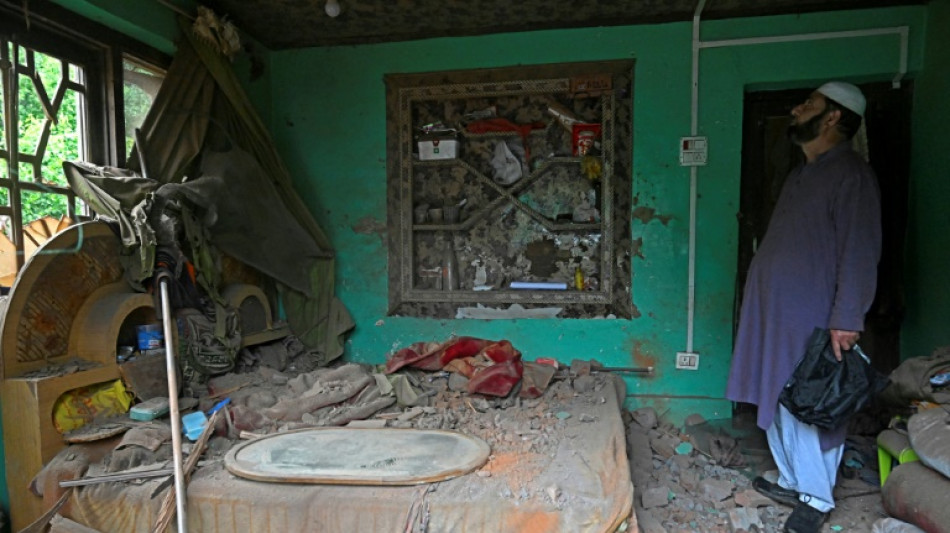Pakistan and India agreed Saturday to a full and immediate ceasefire after days of deadly jet fighter, missile, drone and artillery attacks, the news surprisingly announced by US President Donald, who congratulated them on using "common sense".
Officials from Islamabad and New Delhi confirmed the development minutes after Trump posted the announcement on his Truth Social network, as the conflict between the nuclear-armed neighbours appeared to be spiralling towards a full-blown war.
"After a long night of talks mediated by the United States, I am pleased to announce that India and Pakistan have agreed to a FULL AND IMMEDIATE CEASEFIRE. Congratulations to both Countries on using Common Sense and Great Intelligence," Trump posted.
Indian foreign secretary Vikram Misri said both sides would "stop all firing and military action on land, air and sea" with effect from 5 pm (1130 GMT).
In a statement on X, Pakistan Foreign Minister Ishaq Dar said: "Pakistan and India have agreed to a ceasefire with immediate effect. Pakistan has always strived for peace and security in the region, without compromising on its sovereignty and territorial integrity!"
An Indian government source told AFP that the ceasefire has been worked out bilaterally.
"The stoppage of firing and military action between India and Pakistan was worked out directly between the two countries," the source told AFP, speaking on condition of anonymity.
The ceasefire comes after a day that began with Pakistan attacking Indian air bases in response to what it says were overnight raids on its own.
Indian Wing Commander Vyomika Singh told a briefing earlier Saturday there were "several high-speed missile attacks" on air bases, but "limited damage" to equipment.
Pakistan had earlier accused India of targeting three of its bases with missiles -- including one in Rawalpindi, some 10 kilometres (six miles) from the capital, Islamabad.
Authorities in Pakistan-administered Kashmir said 11 civilians were killed by Indian shelling overnight.
The clashes between the two neighbours are the worst in decades and have killed more than 60 civilians.
- Kashmir attack -
The fighting was touched off by an attack last month in the Indian-administered side of disputed Kashmir that killed 26 tourists, mostly Hindu men, which Delhi blamed on Islamabad.
India accused the Pakistan-based Lashkar-e-Taiba -- a UN-designated terrorist organisation -- of carrying out the attack, but Islamabad has denied any involvement and called for an independent probe.
The countries have fought several wars over the Muslim-majority Kashmir, which both claim in full but administer separate portions of since gaining independence from British rule in 1947.
Earlier Saturday, in a series of calls to senior officials in both countries, US Secretary of State Marco Rubio urged them to restore direct communication to "avoid miscalculation".
Rubio "emphasized that both sides need to identify methods to de-escalate and re-establish direct communication to avoid miscalculation", State Department spokeswoman Tammy Bruce said.
For the first known time since the conflict erupted, Rubio also spoke with Pakistan's army chief, considered the country's key powerbroker.
China also made a similar appeal as did the G7 group of industrialised nations.
The overnight Indian attack on the Rawalpindi air base could be heard from Islamabad.
The air base is used to receive foreign dignitaries, and Saudi minister of state for foreign affairs Adel Al-Jubeir had departed just hours earlier.
Separately, AFP journalists reported loud explosions in Srinagar, the capital of India-administered Kashmir.
A police officer speaking on condition of anonymity said the Awantipora military airbase outside the city had been struck.
The Indian army said "multiple enemy drones were spotted flying over" a military cantonment in Amritsar in Punjab, a state adjoining Kashmir, and were "instantly engaged and destroyed by our air defence units."
- Rush to leave -
In Jammu, Indian-run Kashmir's second biggest city, people scrambled to board a special train dispatched to ferry people out.
"There are loud explosions the entire night," said Karan Varma, a 41-year-old mason.
"There is no choice but to leave".
The overwhelming majority were poor labourers from other parts of India seeking to return to their homes.
On Friday, the Indian army said it had "repulsed" waves of Pakistani attacks using drones and other munitions overnight, and gave a "befitting reply".
Pakistan's military spokesman denied that Islamabad was carrying out such attacks, and vowed revenge for India's initial strikes, on Wednesday.
Pakistani military sources said its forces had shot down 77 drones, with debris of many incursions seen by AFP in cities across the country.
Pakistan's military early Saturday claimed New Delhi's forces had bombed their own territory in Amritsar, without providing evidence.
burs-ach/fox
R.Lacroix--LCdB
